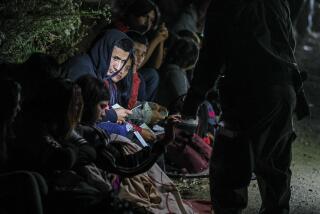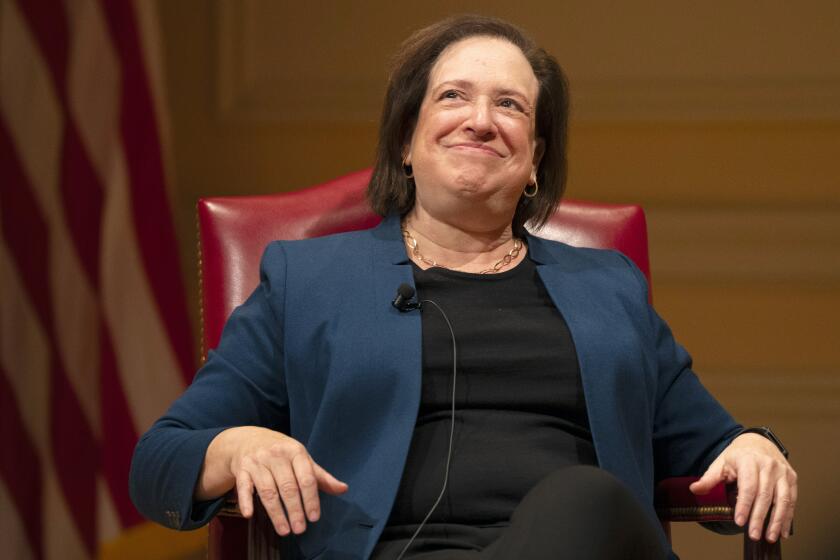Universal Preschool Campaign Pushes to Sway Latino Voters
At a town hall meeting in the airy library of National Hispanic University, scores of Latinos gathered to hear educators and civic leaders tout the benefits of preschool: The classroom experience, they argued, would launch children into school, instilling a love of learning and reducing the likelihood that they would be held back later.
“Early childhood education and preschool are important for the Latino community, because of the positive effects they can have on overall education,” Katrina Mendiola, state advocacy coordinator in the National Council of La Raza’s Sacramento office, told the crowd. “It’s important [that] together we advocate for a preschool-for-all system ... that is going to benefit and serve Latino families.”
Efforts such as the town hall meeting are only one way that proponents of Proposition 82 -- a June ballot measure that would tax the wealthy to raise $2.4 billion annually to fund voluntary, half-day preschool for all 4-year-olds -- are targeting the state’s Latino voters.
Among backers’ first campaign ads was a 30-second spot for Spanish-language television featuring Los Angeles Mayor Antonio Villaraigosa extolling the benefits of preschool.
“Can we change the lives of our kids with just one vote?” he asks in Spanish. “Si, se puede.”
Opponents of the measure are also courting the Latino electorate. A Spanish-language television ad will begin airing in Los Angeles today, and mailers have been sent to Latino households.
“We want to get our message out to every voter: Latino, non-Latino, African American, Asian, white -- it doesn’t matter to me. If they’re voters, we’re contacting them,” said Rick Claussen, campaign manager for the opposition.
“If we had had more money and had been able to spend anywhere near what the other side did, I probably would have made the case much stronger that Hispanics probably have a much greater interest in voting no on this than a lot of other groups,” he said, “because this ought to be means-tested so it goes where it’s needed most, and not to the people who already can afford to send their kids to day care.”
Latinos are sought after by the measure’s proponents, because they are more likely than whites to support the proposition, according to recent polls. And many proponents argue that Latino children, particularly English learners, will be among the biggest beneficiaries if the measure is approved.
In part that is because little more than a third of the state’s Latino children are enrolled in existing preschool programs. Experts attribute this to two factors: cultural norms that shun institutional child care for young children and a lack of preschools in working-class Latino communities.
Ray Buriel, chairman of the Chicano studies department at Pomona College, said his research has found that many Latino mothers prefer close relatives, not strangers, to serve as caretakers.
“That’s a very strong cultural tradition,” he said. “If you have grandparents who live close by ... their role and responsibility is to help take care of the grandchildren until they start formal schooling, which is thought to begin in kindergarten.”
Gloria Rodriguez, author of “Raising Nuestros Ninos: Bringing Up Latino Children in a Bicultural World,” said many immigrant parents are unaware of the benefits of early childhood education, because they didn’t experience preschool or kindergarten themselves.
“That’s ignorance. That doesn’t mean they wouldn’t do it if they are told” about the benefits of preschool, said Rodriguez, founder of Avance, a highly regarded San Antonio-based nonprofit group that focuses on early childhood and parental education.
Old-world mind-sets are transformed when parents are made aware of how much children can learn before age 5, she said.
“If they come to the United States and they were not educated, did not have opportunities and they themselves don’t understand the importance of reading to children in the early years, we’ve got to change that attitude and help them,” she said. “You can change minds and you can have an impact on your community.”
Beyond attitudes, however, universal preschool advocates argue that a key problem is a paucity of preschools where they are most needed -- which Proposition 82 would address. A study underway for the National Taskforce on Early Education for Hispanics shows several swaths of Los Angeles County with large Latino populations, such as South Gate and Montebello, lacking sufficient preschool capacity.
“Often, the problem is simply one of access, because there aren’t enough spaces for these children,” said Graciela Italiano-Thomas, chief executive of Los Angeles Universal Preschool, which is funded by the state’s First Five Commission.
Whatever the reasons, research shows that children from Spanish-language households are far less likely to attend preschool than their English-speaking peers.
According to a nationwide study released in January by UC Santa Barbara researchers, roughly 68% of all children attend some form of preschool, but less than 50% of children from Spanish-speaking households do. The numbers are even more dramatic in Los Angeles County: Less than 40% of Latino children attend preschool, according to data from the National Council of La Raza.
Those who do are better prepared when they enter kindergarten, according to the UC Santa Barbara study. However, any academic gains fade during elementary school, leaving a persistent achievement gap between whites and minorities. Opponents of the preschool measure argue that because of the fading benefit, educational dollars would be better spent improving elementary classes.
For proponents, language issues are reason enough for preschool, since more than a third of children entering kindergarten in California speak limited or no English.
“It is absolutely the best time for children to learn a second language,” said Rosalie Porter, director of the Institute for Research in English Acquisition and Development in Amherst, Mass.
“It’s an ideal age -- they learn it quickly and they learn it naturally, through playing and counting and learning letters and colors. Then they are ready for kindergarten and first grade, when they start learning to read in English.”
Experts say it is crucial to make lessons culturally sensitive. For example, in the San Jose classroom of preschool teacher Carmen Vega, the classic tale of Goldilocks features her sampling steaming bowls of menudo instead of porridge.
Additionally, it is vital to promote preschool through trusted institutions, such as the church, said Italiano-Thomas: “Go to where the community is.”
Proposition backers are following that advice. Earlier this month, United Farm Workers co-founder Dolores Huerta spent the day touting Proposition 82 in interviews with Spanish-language media from around the state.
And the National Council of La Raza, which has endorsed Proposition 82, is holding town hall meetings in Latino communities across California to explain the benefits of preschool.
At the San Jose meeting, a graceful pair of colorfully dressed folklorico dancers entertained the crowd before a panel of politicians, activists and educators described the effects of early childhood education.
Santa Clara County Supervisor Blanca Alvarado urged the 60 people in the audience to share what they had learned.
“Talk to your neighbors, your family and everyone you know about the importance of preschool,” she said. “This issue is of such national importance.”
Irene Hinojosa, 34, said her three older children did not attend preschool because she didn’t understand its value. But the homemaker and occasional housekeeper planned to enroll her youngest, 3-year-old Martin Rodriguez.
“I learned a lot today. It will be difficult for me” to be apart from him, said the Mexicali native. “But I know he’ll do well.”
*
(BEGIN TEXT OF INFOBOX)
Latino children statewide are less likely to be enrolled in preschool than their white counterparts. In Los Angeles County, many working class Latino neighborhoods with a large population of children younger than 5 have relatively few preschools.
*
Many Southern California counties below average
-
Almost half of all children age 5 and younger in the state are Latino, but fewer than 37% of those children attend preschool. In Southern California counties, Riverside, San Bernardino, Orange and Ventura lag behind the state average.
--
Latino children enrolled in preschool or nursery school
(By percent, for Southern California counties)
California: 36.8%
Riverside: 27.6%
Orange: 30.5%
Ventura: 32.4%
San Bernardino:34.1%
Santa Barbara: 37.2%
Los Angeles: 38.6%
San Diego: 39.4%
Imperial: 44.4%
--
Sources: The National Task Force on Early Education for Hispanics, National Council of La Raza.
More to Read
Get the L.A. Times Politics newsletter
Deeply reported insights into legislation, politics and policy from Sacramento, Washington and beyond. In your inbox three times per week.
You may occasionally receive promotional content from the Los Angeles Times.







